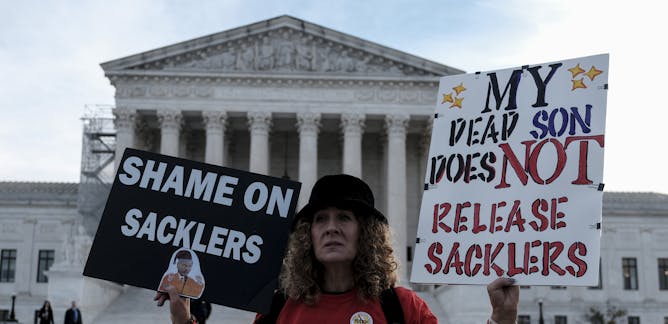
Articles sur Opioid crisis
Affichage de 1 à 20 de 86 articles

The company helped spur a public health crisis through its deceptive marketing and aggressive sales of prescription opioids.

The toxic drug crisis is not only about fatalities. A much larger number of people survive overdoses, and are left with brain injuries. A national strategy to support and treat them is crucial.

Decriminalizing drugs is not intended as a solution to drug problems. Rather, it is a critical first step that’s necessary, but not sufficient, for replacing prohibition with a public health approach.

Calls to destigmatize language around drug addiction must be combined with action to change policies that stigmatize people in early recovery.

Undertreated pain can result in unnecessary suffering and a greater likelihood of long-term chronic pain.

Harm reduction is grounded in evidence. But policies, stigma and ignorance about substance use still create barriers in battling Canada’s drug poisoning crisis.

Higher levels of income inequality in youth are associated with increased ‘deaths of despair’ in young Canadians.

The Pulitzer Prize-winning author is just one of many artists from Appalachia who are probing the crisis in their work, while taking pains to ensure that it doesn’t define the region and its people.

Decriminalization helps recharacterize drug addiction as a chronic health condition instead of a criminal activity, reduces the stigma associated with drug use and improves treatment options.

As British Columbia begins a new era in drug policy, the drug poisoning crisis continues without an end in sight.

More than 50 overdoses happen in bathrooms every month in British Columbia. Public bathrooms can be made safer for everyone, including people who use substances.

Making them pay is important but it’s not going to stop drugmakers from endangering public health.

The Purdue Pharma settlement is paltry compared to costs of the opioid crisis. Without major changes to pharma industry regulation, there is little reason to think a similar crisis won’t occur again.

British Columbia’s bold experiment provides an opportunity to implement more balance in Canadian drug policy, and a more principled withdrawal from the war on drugs.

Non-opioid directives allow patients to refuse opioids in all health care settings. For surgical procedures that require anesthesia, however, this may do more harm than good.

Game making is an art form that many aren’t intimately familiar with. Unlike other creative practices, game makers must create the rules and laws that govern and shape player behaviours.

Measures to curb growing rates of opioid use are also making it difficult for people with long-term, chronic pain to get ongoing prescriptions.

People are dying from using a toxic drug supply. Safer supply and other approaches that listen to the needs of people who use drugs are critical to saving lives and addressing the opioid crisis.

Drug manufacturers often shun the use of placebos in clinical trials. But research suggests that placebos could play an important role in the treatment of depression, pain and other maladies.

The number of fatal drug overdoses in the US over a 12-month period has surpassed 100,000 for the first time. Fentanyl is the main driver of the spike in deaths.
